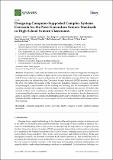| dc.contributor.author | Yoon, Susan | |
| dc.contributor.author | Anderson, Emma | |
| dc.contributor.author | Koehler-Yom, Jessica | |
| dc.contributor.author | Scheintaub, Hal | |
| dc.contributor.author | Oztok, Murat | |
| dc.contributor.author | Evans, Chad | |
| dc.contributor.author | Goh, Sao-Ee | |
| dc.contributor.author | Klopfer, Eric | |
| dc.contributor.author | Sheldon, Joshua | |
| dc.contributor.author | Schoenfeld, Ilana | |
| dc.contributor.author | Wendel, Daniel J | |
| dc.date.accessioned | 2017-05-24T19:26:10Z | |
| dc.date.available | 2017-05-24T19:26:10Z | |
| dc.date.issued | 2016-12 | |
| dc.date.submitted | 2016-11 | |
| dc.identifier.issn | 2079-8954 | |
| dc.identifier.uri | http://hdl.handle.net/1721.1/109323 | |
| dc.description.abstract | We present a curriculum and instruction framework for computer-supported teaching and learning about complex systems in high school science classrooms. This work responds to a need in K-12 science education research and practice for the articulation of design features for classroom instruction that can address the Next Generation Science Standards (NGSS) recently launched in the USA. We outline the features of the framework, including curricular relevance, cognitively rich pedagogies, computational tools for teaching and learning, and the development of content expertise, and provide examples of how the framework is translated into practice. We follow this up with evidence from a preliminary study conducted with 10 teachers and 361 students, aimed at understanding the extent to which students learned from the activities. Results demonstrated gains in students’ complex systems understanding and biology content knowledge. In interviews, students identified influences of various aspects of the curriculum and instruction framework on their learning. | en_US |
| dc.description.sponsorship | National Science Foundation (U.S.) (1019228) | en_US |
| dc.language.iso | en_US | |
| dc.publisher | MDPI AG | en_US |
| dc.relation.isversionof | http://dx.doi.org/10.3390/systems4040038 | en_US |
| dc.rights | Creative Commons Attribution 4.0 International License | en_US |
| dc.rights.uri | http://creativecommons.org/licenses/by/4.0/ | en_US |
| dc.source | MDPI | en_US |
| dc.title | Designing Computer-Supported Complex Systems Curricula for the Next Generation Science Standards in High School Science Classrooms | en_US |
| dc.type | Article | en_US |
| dc.identifier.citation | Yoon, Susan et al. “Designing Computer-Supported Complex Systems Curricula for the Next Generation Science Standards in High School Science Classrooms.” Systems 4.4 (2016): 38. | en_US |
| dc.contributor.department | Massachusetts Institute of Technology. Computer Science and Artificial Intelligence Laboratory | en_US |
| dc.contributor.department | Massachusetts Institute of Technology. Department of Urban Studies and Planning | en_US |
| dc.contributor.department | Massachusetts Institute of Technology. Institute for Data, Systems, and Society | en_US |
| dc.contributor.mitauthor | Klopfer, Eric | |
| dc.contributor.mitauthor | Sheldon, Joshua | |
| dc.contributor.mitauthor | Schoenfeld, Ilana | |
| dc.contributor.mitauthor | Wendel, Daniel J | |
| dc.relation.journal | Systems | en_US |
| dc.eprint.version | Final published version | en_US |
| dc.type.uri | http://purl.org/eprint/type/JournalArticle | en_US |
| eprint.status | http://purl.org/eprint/status/PeerReviewed | en_US |
| dspace.orderedauthors | Yoon, Susan; Anderson, Emma; Klopfer, Eric; Koehler-Yom, Jessica; Sheldon, Josh; Schoenfeld, Ilana; Wendel, Daniel; Scheintaub, Hal; Oztok, Murat; Evans, Chad; Goh, Sao-Ee | en_US |
| dspace.embargo.terms | N | en_US |
| mit.license | PUBLISHER_CC | en_US |
